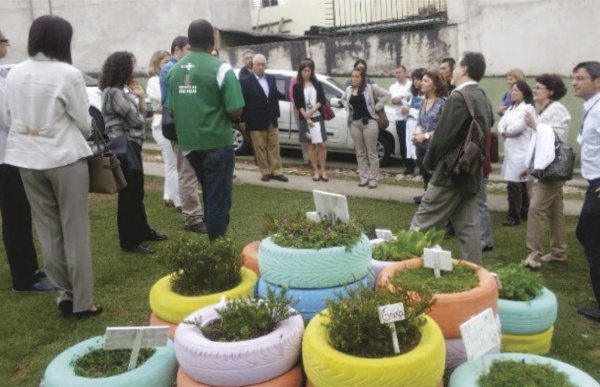Green and Healthy Environments Program in Sao Paulo (PAVS)
PAVS' holistic approach integrates environmental issues in health promotion and activities to improve quality of life under the Programa Saúde da Família – PSF (Family Health Program) in the São Paulo municipality. PAVS strengthens intersectoral policy management at the local level by providing training and skills-building opportunities to about 7,000 community health and social protection agents. It promotes the development of community projects based on local strengths and needs.
Meets the criteria established under Health in All Policies:
- Political commitment. Although it does not reflect a political commitment at the highest levels of government PAVS enjoys the strong support and leadership of the Municipal Health Secretariat of São Paulo.
- Separate structure. The Municipal Secretariat of Green Spaces and the Environment (SVMA) launched this initiative. Several national and international entities are involved in its implementation: Ministry of Health of Brazil, PAHO/WHO, UNEP, University of São Paulo, FLACSO, FIOCRUZ, the Municipal Secretariats of Environment, Health, Social Assistance, and Development, and twelve partners from the Municipal Health Secretariat that participated in the National Family Health Program (PSF). PAVS' Board of Directors was established in the first phase of the program and includes representatives from several of these entities. The original project has now been converted into a program under the Municipal Health Secretariat.
- Participation of other sectors. Other sectors besides health are involved in this program. The municipal Secretariats of Health, Environment, Education, and Social Assistance all collaborate within the Family Health Program (PSF). The Secretary of Urban Infrastructure and Services (waste management and other utilities) as well as the subprefectures also provide support for the program.
- Separate budget. PAVS has its own budget. SVMA, the Ministry of Health/Municipal Health Secretariat, and UNEP provided funding for the planning and training phase. PAVS is currently funded through the municipality, within the framework of PSF.
- Focus on reducing inequity. São Paulo faces big challenges in tackling the effects of social exclusion and inequality on urban and human development. As part of PSF, PAVS operates in high- risk, vulnerable areas.
- Intersectoral work in action. PAVS was created to address the lack of coordination among different policies and to develop an environmental management strategy with community participation. It has strengthened an intersectoral approach within the PSF program by stressing health promotion and raising public awareness in the population about environmental issues that can contribute to better health.
- Public policy. Although PAVS is not involved in the design of public policies that impact health, it raises public awareness about environmental issues that can contribute to better health.
- Scientific evidence of results. There is scientific evidence of the program's results. PAVS developed its own outcome indicators. Families have changed their behaviors and incorporated new environmental health practices into their daily lives, including growing their own fruits and vegetables in private orchards and gardens and improving their dietary habits. More than 1,400 projects have been carried out based on this environmental health approach. Some of these have been completed, while others are still in progress.
- Social participation. Neighborhood, merchant and entrepreneurs associations participate in the program, along with environmental NGOs. They play an important role in supporting and implementing program evaluations. PAVS socio-environmental projects are designed and implemented based on surveys conducted by health agents with community participation.
